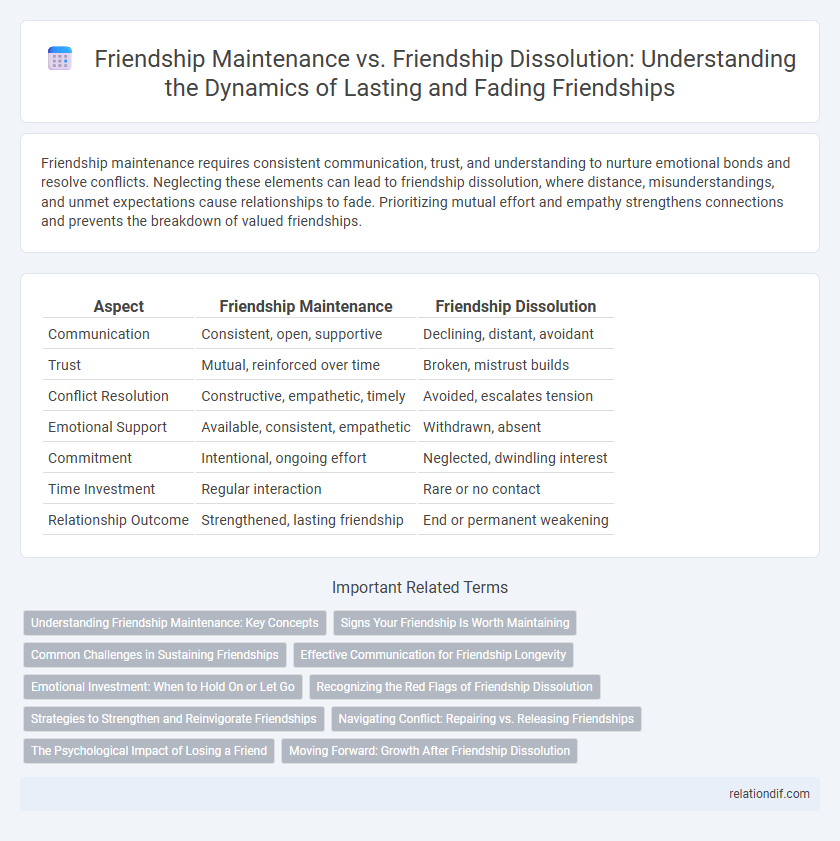Friendship maintenance requires consistent communication, trust, and understanding to nurture emotional bonds and resolve conflicts. Neglecting these elements can lead to friendship dissolution, where distance, misunderstandings, and unmet expectations cause relationships to fade. Prioritizing mutual effort and empathy strengthens connections and prevents the breakdown of valued friendships.
Table of Comparison
| Aspect | Friendship Maintenance | Friendship Dissolution |
|---|---|---|
| Communication | Consistent, open, supportive | Declining, distant, avoidant |
| Trust | Mutual, reinforced over time | Broken, mistrust builds |
| Conflict Resolution | Constructive, empathetic, timely | Avoided, escalates tension |
| Emotional Support | Available, consistent, empathetic | Withdrawn, absent |
| Commitment | Intentional, ongoing effort | Neglected, dwindling interest |
| Time Investment | Regular interaction | Rare or no contact |
| Relationship Outcome | Strengthened, lasting friendship | End or permanent weakening |
Understanding Friendship Maintenance: Key Concepts
Friendship maintenance involves intentional actions like effective communication, mutual support, and conflict resolution to sustain relationships over time. Core concepts include reciprocity, trust, and emotional sharing, which foster closeness and prevent dissolution. Neglecting these elements can lead to decreased intimacy, misunderstandings, and eventual friendship dissolution.
Signs Your Friendship Is Worth Maintaining
Consistent honest communication, mutual respect, and shared support are key signs your friendship is worth maintaining. When conflicts arise, a willingness to resolve issues rather than avoid them highlights the strength of the bond. Positive emotional experiences and genuine care indicate a lasting friendship that should be nurtured.
Common Challenges in Sustaining Friendships
Common challenges in sustaining friendships include communication breakdowns, evolving personal priorities, and lack of shared experiences. Emotional distance often grows when friends fail to address conflicts or provide mutual support during life changes. Persistent misunderstandings and unmet expectations frequently lead to friendship dissolution despite initial strong bonds.
Effective Communication for Friendship Longevity
Effective communication plays a crucial role in maintaining friendship longevity by fostering trust, understanding, and emotional support between friends. Open and honest conversations help address conflicts early, preventing misunderstandings that can lead to friendship dissolution. Consistent, empathetic dialogue strengthens bonds and ensures mutual respect, making friendships more resilient over time.
Emotional Investment: When to Hold On or Let Go
Emotional investment plays a critical role in determining whether to maintain or dissolve a friendship, as it reflects the depth of trust, support, and shared experiences. Holding on to friendships with mutual emotional commitment fosters resilience and long-term connection, while letting go becomes necessary when emotional tolls outweigh benefits, causing stress or diminishing well-being. Prioritizing self-care and recognizing patterns of imbalance help individuals make informed decisions about sustaining or ending friendships.
Recognizing the Red Flags of Friendship Dissolution
Recognizing the red flags of friendship dissolution is crucial for maintaining healthy relationships, including consistent communication breakdowns, lack of mutual support, and growing emotional distance. Patterns such as frequent misunderstandings, unbalanced effort, and feelings of resentment signal the potential decline of a friendship. Addressing these issues early can prevent the loss of valuable connections and promote long-term friendship maintenance.
Strategies to Strengthen and Reinvigorate Friendships
Effective friendship maintenance relies on consistent communication, active listening, and shared experiences to deepen trust and emotional bonds. Strategies to strengthen friendships include expressing appreciation regularly, resolving conflicts with empathy, and investing time in enjoyable activities together. Reinvigorating friendships often involves rediscovering common interests, initiating honest conversations about growth, and adapting to changes in each other's lives.
Navigating Conflict: Repairing vs. Releasing Friendships
Navigating conflict in friendships requires balancing repair efforts and the choice to release toxic relationships. Effective conflict resolution involves active listening, empathy, and clear communication to rebuild trust and strengthen bonds. When repair attempts consistently fail or cause emotional harm, releasing the friendship may be necessary for personal well-being and growth.
The Psychological Impact of Losing a Friend
Losing a friendship triggers significant psychological distress, including feelings of loneliness, grief, and lowered self-esteem, as the brain processes this loss similarly to physical pain. The maintenance of friendships involves consistent communication, trust-building, and emotional support, which protect against these adverse effects by fostering a sense of belonging. Without these protective factors, friendship dissolution can lead to increased stress, anxiety, and even depression, highlighting the importance of proactive relationship care.
Moving Forward: Growth After Friendship Dissolution
Moving forward after friendship dissolution involves personal growth and emotional resilience, allowing individuals to reflect on lessons learned and redefine their social boundaries. Prioritizing self-awareness and healthier relationship patterns encourages rebuilding trust and fostering new, meaningful connections. Embracing change promotes mental well-being and supports adaptive coping strategies in navigating future friendships.
Friendship maintenance vs Friendship dissolution Infographic

 relationdif.com
relationdif.com